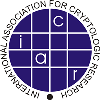New Impossibility
Results for Concurrent Composition and a Non-Interactive Completeness Theorem
for Secure Computation
Shweta Agrawal (UCLA)
Vipul Goyal (MSR,
Abhishek Jain (UCLA)
Manoj Prabhakaran (UIUC)
Amit Sahai (UCLA)
On the Distribution
of Linear Biases: Three Instructive Examples
Mohamed Ahmed Abdelraheem (
Martin Ågren (
Peter Beelen (
Gregor Leander (
Collusion-Preserving
Computation
Joel Alwen (ETH
Jonathan Katz (
Ueli Maurer (ETH
Vassilis Zikas (
Efficient Padding
Oracle Attacks on Cryptographic Hardware
Romain Bardou (INRIA, France)
Riccardo Focardi (Università Ca'
Yusuke Kawamoto (
Lorenzo Simionato (Università Ca' Foscari,
Graham Steel (INRIA, France)
Joe-Kai Tsay (NTNU,
Resistance Against
Iterated Attacks Revisited
Atefeh Mashatan (EPFL,
Serge Vaudenay (EPFL,
Secret Sharing
Schemes for Very Dense Graphs
Amos Beimel (
Yuval Mintz (
Oriol Farras (Universitat Rovira i
Semantic Security for
the Wiretap Channel
Mihir Bellare (UCSD)
Stefano Tessaro (MIT)
Alexander Vardy (UCSD)
Multi-Instance
Security and its Application to Password-Based Cryptography
Mihir Bellare (UCSD)
Thomas Ristenpart (
Stefano Tessaro (MIT)
Near-Linear
Unconditionally-Secure Multiparty Computation with a Dishonest Minority
Eli Ben-Sasson (
Serge Fehr (CWI, The
Rafail Ostrovsky (UCLA)
Quantum to Classical
Randomness Extractors
Mario Berta (ETH
Omar Fawzi (
Stephanie Wehner (National
Succinct Arguments
from Multi-Prover Interactive Proofs and their Efficiency Benefits
Nir Bitansky (
Alessandro Chiesa (MIT)
Fully Homomorphic
Encryption without Modulus Switching from Classical GapSVP
Zvika Brakerski (
Securing Circuits
Against Constant-Rate Tampering
Dana Dachman-Soled (Microsoft Research
Yael Tauman Kalai (Microsoft Research New
Secure Database
Commitments and Universal Arguments of Quasi Knowledge
Melissa Chase (Microsoft Research
Ivan Visconti (
Multiparty
Computation from Somewhat Homomorphic Encryption
Ivan Damgard (
Valerio Pastro (
Nigel Smart (
Sarah Zakarias (
Efficient Dissection
of Composite Problems, with Applications to Cryptanalysis, Knapsacks, and
Combinatorial Search Problems
Itai Dinur (Weizmann Institute,
Orr Dunkelman (Weizmann Institute and
Nathan Keller (Weizmann Institute and
Adi Shamir (Weizmann Institute,
Differential Privacy
with Imperfect Randomness
Yevgeniy Dodis (NYU)
Adriana Lopez-Alt (NYU)
Ilya Mironov (Microsoft Research)
Salil Vadhan (
To Hash or Not to
Hash Again? (In)differentiability Results for H^2 and HMAC
Yevgeniy Dodis (NYU)
Thomas Ristenpart (University of Wisconsin-Madison)
John Steinberger (
Stefano Tessaro (MIT)
Hardness of Computing
Individual Bits for One-way Functions on Elliptic Curves
Alexandre Duc (EPFL,
Dimitar Jetchev (EPFL,
Actively Secure
Two-Party Evaluation of any Quantum Operation
Frédéric Dupuis (ETH Zürich)
Louis Salvail (
Jesper Buus Nielsen (
Impossibility Results
for Static Input Secure Computation
Sanjam Garg (UCLA)
Abishek Kumarasubramanian (UCLA)
Rafail Ostrovsky (UCLA)
Ivan Visconti (
Adaptively Secure
Multi-Party Computation with Dishonest Majority
Sanjam Garg (UCLA)
Amit Sahai (UCLA)
Crowd-Blending
Privacy
Johannes Gehrke (
Michael Hay (
Edward Lui (
Homomorphic
Evaluation of the AES Circuit
Craig Gentry (IBM Research)
Shai Halevi (IBM Research)
Nigel P. Smart (
Functional Encryption
with Bounded Collusions via Multi-Party Computation
Sergey Gorbunov (
Vinod Vaikuntanathan (
Hoeteck Wee (
On the Impossibility
of Constructing Efficient Key Encapsulation and Programmable Hash Functions
in Prime Order Groups
Goichiro Hanaoka (RISEC, AIST,
Takahiro Matsuda (RISEC, AIST,
Jacob C.N. Schuldt (RISEC, AIST,
Tightly Secure
Signatures and Public-Key Encryption
Dennis Hofheinz (Karlsruhe Institute of
Tibor Jager (Karlsruhe Institute of
An Enciphering Scheme
Based on a Card Shuffle
Viet Tung Hoang (
Ben Morris (
Phillip Rogaway (
Breaking and
Repairing GCM Security Proofs
Tetsu Iwata (
Keisuke Ohashi (
Kazuhiko Minematsu (NEC Corporation,
On the Security of
TLS-DHE in the Standard Model
Tibor Jager (
Florian Kohlar (
Sven Schäge (
Jörg Schwenk (
New Preimage Attacks
Against Reduced SHA-1
Simon Knellwolf (ETH
Dmitry Khovratovich (Microsoft Research
Tweakable
Blockciphers with Beyond Birthday-Bound Security
Will Landecker (
Thomas Shrimpton (
Seth Terashima (
Public Keys
Arjen K. Lenstra (EPFL,
James P. Hughes (Self,
Maxime Augier (EPFL,
Joppe W. Bos (EPFL,
Thorsten Kleinjung (EPFL,
Christophe Wachter (EPFL,
New Proof Methods for
Attribute-Based Encryption: Achieving Full Security through Selective
Techniques
Allison Lewko (
Brent Waters (
Group Signatures with
Almost-for-free Revocation
Benoit Libert (UCL,
Thomas Peters (UCL,
Moti Yung (Google Inc. and
Black-Box
Constructions of Composable Protocols without Set-Up
Huijia Rachel Lin (MIT and
Tamper and Leakage
Resilience in the Split-State Model
Feng-Hao Liu (
Anna Lysyanskaya (
The Curious Case of
Non-Interactive Commitments
Mohammad Mahmoody (
Hash Functions Based
on Three Permutations: A Generic Security Analysis
Bart Mennink (KU
Bart Preneel (KU
Substitution-permutation
networks, pseudorandom functions, and Natural Proofs
Eric Miles (Northeastern University)
Emanuele Viola (Northeastern University)
A New Approach to
Practical Active-Secure Two-Party Computation
Jesper Buus Nielsen (
Peter Sebastian Nordholt (
Claudio Orlandi (
Sai Sheshank Burra (Indian
Must you know the
code of f to securely compute f?
Mike Rosulek (
Universal
Composability From Essentially Any Trusted Setup
Mike Rosulek (
How to Compute under
AC^0 Leakage without Secure Hardware
Guy Rothblum (Microsoft Research
Dynamic Credentials
and Ciphertext Delegation for Attribute-Based Encryption
Amit Sahai (UCLA)
Hakan Seyalioglu (UCLA)
Brent Waters (
Stam's Conjecture and
Threshold Phenomena in Collision Resistance
John Steinberger (
Xiaoming Sun (Chinese
Zhe Yang (Hulu, Beijing, China)
Functional Encryption
for Regular Languages
Brent Waters (
Secure Identity-based
Encryption in the Quantum Random Oracle Model
Mark Zhandry (
